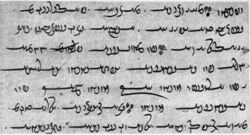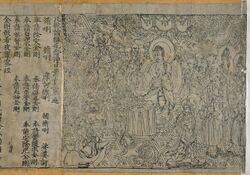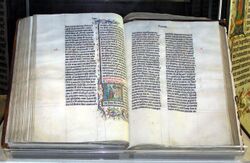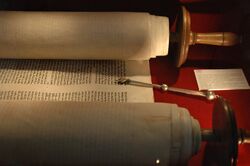Religion:List of religious texts
The following is a non-exhaustive list of links to specific religious texts which may be used for further, more in-depth study.
Bronze Age
Ancient Egyptian religion
- Pyramid Texts
- Coffin Texts
- Book of the Dead
- Book of Caverns
- Book of Gates
- Amduat
- Book of the Heavenly Cow
- Litany of Re
- The Contendings of Horus and Seth
- Atenism: Great Hymn to the Aten
Sumerian religion
- Hymn to Enlil
- Kesh Temple Hymn
- Song of the hoe
- Debate between Winter and Summer
- Epic of Gilgamesh
- Epic of Enmerkar
- Enmerkar and the Lord of Aratta
- Enmerkar and En-suhgir-ana
- Epic of Lugalbanda
- Lugalbanda in the Mountain Cave
- Lugalbanda and the Anzud Bird
- Angim
- Enki and the World Order
- Enlil and Ninlil
- Enlil and Namzitara
- Inanna and Utu
- Inanna Prefers the Farmer
- Inanna and Enki
- Inanna Takes Command of Heaven
- Inanna and Ebih
- Inanna and Shukaletuda
- Inanna and Bilulu
- Inanna's Descent into the Underworld
- Ninurta's Journey to Eridu
Babylonian religion
- Enūma Eliš
- Epic of Gilgamesh
- Agushaya Hymn
- Atra-Hasis
- Labbu myth
- Nergal and Ereshkigal
- Epic of Erra
- Enmesharra's Defeat
- Anzû and the Tablet of Destinies
Canaanite religion
- Baal Cycle
- Legend of Keret
- Tale of Aqhat
Classical antiquity
Etruscan religion
- Liber Linteus
- Pyrgi Tablets
Ancient Greek religion
- Aretalogy
- Argonautica
- Bibliotheca
- Derveni papyrus
- Ehoiai
- Homeric Hymns
- Iliad
- Odyssey
- Telegony
- The golden verses of Pythagoras
- Delphic maxims
- Theogony
- Works and Days
- Epic Cycle
- Theban Cycle
Hermeticism
- Hermetica
- Emerald Tablet
- Asclepius
Mandaeism
Main texts:
Ritual texts:
- The Wedding of the Great Shishlam
- Scroll of the Parwanaya
- Scroll of the Great Baptism
- Scroll of the Ancestors
- Zihrun Raza Kasia
Esoteric texts:
- The Thousand and Twelve Questions
- Scroll of Exalted Kingship
- The Coronation of the Great Shishlam
- Alma Rišaia Rba
- Alma Rišaia Zuṭa
- The Baptism of Hibil Ziwa
- Scroll of Abatur
- Dmut Kušṭa
- Secrets of the Ancestors
- Scroll of the Rivers
- Book of the Zodiac
Historical texts:
Others:
Manichaeism
- Gospel of Mani
- Treasure of Life
- Pragmateia
- The Book of Giants
- Fundamental Epistle
- Manichaean Psalter
- Shabuhragan
- Arzhang
- Kephalaia, found in Coptic translation.
Orphism
- Orphic poems
East Asian religions
Confucianism
The Four Books and Five Classics:
- The Five Classics (I Ching, Book of Documents, Classic of Poetry, Book of Rites, Spring and Autumn Annals)
- The Four Books (Great Learning, Doctrine of the Mean, Analects, Mencius)
The Thirteen Classics (I Ching, Book of Documents, Classic of Poetry, Rites of Zhou, Etiquette and Ceremonial, Book of Rites, The Commentary of Zuo, The Commentary of Gongyang, The Commentary of Guliang, The Analects, Classic of Filial Piety, Erya, Mencius)
Taoism
- Daozang, meaning "Taoist Canon", consists of around 1,400 texts that were collected to bring together all of the teachings of Taoism.
- Tao Te Ching
- Zhuangzi
- Liezi
- Qingjing Jing
- Taiping Jing
- Sanhuangjing
- Huangdi Yinfujing
- Xishengjing
- Huahujing
- Baopuzi
- List of Lingbao texts
- Xiang'er
- Zuowanglun
- Yunji Qiqian
- Wuzhen pian
- Holy Emperor Guan's True Scripture to Awaken the World
- Treatise On the Response of the Tao
Shinto
- The Kojiki
- The Rikkokushi, which includes the Nihon Shoki and the Shoku Nihongi
- The Fudoki
- The Jinnō Shōtōki
- The Kujiki
Iranian religions
Zoroastrianism
Primary religious texts (the Avesta collection):
- The Yasna, the primary liturgical collection, includes the Gathas.
- The Visperad, a collection of supplements to the Yasna.
- The Yashts, hymns in honor of the divinities.
- The Vendidad, describes the various forms of evil spirits and ways to confound them.
- shorter texts and prayers, the Yashts the five Nyaishes ("worship, praise"), the Sirozeh and the Afringans (blessings).
There are some 60 secondary religious texts, none of which are considered scripture. The most important of these are:
- The Denkard (Middle Persian, 'Acts of Religion'),
- The Bundahishn, (Middle Persian, 'Primordial Creation')
- The Menog-i Khrad, (Middle Persian, 'Spirit of Wisdom')
- The Arda Viraf Namak (Middle Persian, 'The Book of Arda Viraf')
- The Sad-dar (modern Persian, 'Hundred Doors', or 'Hundred Chapters')
- The Rivayats, 15th–18th century correspondence on religious issues
For general use by the laity:
- The Zend (lit. commentaries), various commentaries on and translations of the Avesta.
- The Khordeh Avesta, Zoroastrian prayer book for lay people from the Avesta.
Yarsanism
Yazidi
The true core texts of the Yazidi religion that exist today are the hymns, known as qawls. Spurious examples of so-called "Yazidi religious texts" include the Yazidi Black Book and the Yazidi Book of Revelation, which are believed to have been forged in the early 20th century; the Yazidi Black Book, for instance, is thought to be a combination of genuine Yazidi beliefs and Western forgeries.[1][2]
Indian religions
Ayyavazhi
Akilattirattu Ammanai:
- Akilam one
- Akilam two
- Akilam three
- Akilam four
- Akilam five
- Akilam six
- Akilam seven
- Akilam eight
- Akilam nine
- Akilam ten
- Akilam eleven
- Akilam twelve
- Akilam thirteen
- Akilam fourteen
- Akilam fifteen
- Akilam sixteen
- Akilam seventeen
Arul Nool:
- Ukappadippu
- Pothippu
- Ucchippadippu
- Saattu Neettolai
- Nadutheervai Ula
- Panchadevar Urppatthi
- Patthiram
- Sivakanta Athikarappatthiram
- Thingal patham
- Saptha Kannimar Padal
- Kalyana Vazhthu
Buddhism
Theravada Buddhism:
- The Tipitaka or Pāli Canon
- Vinaya Pitaka
- Suttavibhaṅga: Pāṭimokkha and commentary
- Mahāvibhaṅga: rules for monks
- Bhikkhunīvibhaṅga: rules for nuns
- Khandhaka: 22 chapters on various topics
- Parivāra: analyses of rules from various points of view
- Suttavibhaṅga: Pāṭimokkha and commentary
- Sutta Pitaka
- Digha Nikaya, the "long" discourses (including Brahmajāla Sutta, Samaññaphala Sutta, Sigālovāda Sutta and Mahāparinibbāṇa Sutta)
- Majjhima Nikaya, the "middle-length" discourses (including Ānāpānasati Sutta and Sammādiṭṭhi Sutta)
- Samyutta Nikaya, the "connected" discourses (including Ādittapariyāya Sutta, Dhammacakkappavattana Sutta & Anattalakkhaṇa Sutta)
- Anguttara Nikaya, the "numerical" discourses (including Dīghajāṇu Sutta)
- Khuddaka Nikaya, the "minor collection" (including Dhammapada, Udāna, Itivuttaka, Sutta Nipāta, Theragatha and Therīgāthā)
- Abhidhamma Pitaka
- Dhammasaṅganī (-saṅgaṇi or -saṅgaṇī)
- Vibhaṅga (vibhaṅga)
- Dhātukathā (dhātukathā)
- Puggalapaññatti (-paññatti)
- Kathāvatthu (kathā-)
- Yamaka
- Paṭṭhāna (paţţhāna)
- Vinaya Pitaka
East Asian Mahayana:
- The Chinese Buddhist Mahayana sutras, including
- Diamond Sutra and the Heart Sutra
- Shurangama Sutra and its Shurangama Mantra
- Great Compassion Mantra
- Pure Land Buddhism
- Infinite Life Sutra
- Amitabha Sutra
- Contemplation Sutra
- other Pure Land Sutras
- Tiantai, Tendai, and Nichiren
- Lotus Sutra
- Shingon
- Mahavairocana Sutra
- Vajrasekhara Sutra
Tibetan Buddhism:
- Tibetan Kangyur and Tengyur
Hinduism
- The Four Vedas
- Rig Veda
- Sama Veda
- Yajur Veda
- Atharva Veda
- Samhitas (Mantras, Prayers)
- Brahmanas (Commentaries, Instructions)
- Aranyakas (Meditation, Rituals)
- Upanishads (Essence, Wisdom)
- Itihāsas
- Mahābhārata (including the Bhagavad Gita)
- Ramayana
- Puranas (List)
- Tantras
- Sutras (List)
- Stotras
- Ashtavakra Gita
- Gherand Samhita
- Gita Govinda
- Hatha Yoga Pradipika
- Yoga Vasistha
In Purva Mimamsa:
In Vedanta (Uttar Mimamsa):
- Brahma Sutras of Vyasa
In Yoga:
In Samkhya:
- Samkhya Sutras of Kapila
In Nyaya:
- Nyāya Sūtras of Gautama
In Vaisheshika:
- Vaisheshika Sutras of Kanada
In Vaishnavism:
- Vaikhanasa Samhitas
- Pancaratra Samhitas
- Divyaprabandha
In Saktism:
- Sakta Tantras
In Kashmir Saivism:
- 64 Bhairavagamas
- 28 Shaiva Agamas
- Shiva Sutras of Vasugupta
- Vijnana Bhairava Tantra
- Pashupata-sutra of Lakulisha
- Panchartha-bhashya of Kaundinya (a commentary on the Pashupata Sutras)
- Ganakarika
- Ratnatika of Bhasarvajna
In Shaiva Siddhanta:
- 28 Saiva Agamas
- Tirumurai (canon of 12 works)
- Meykandar Shastras (canon of 14 works)
- Brahma Samhita
- Jayadeva's Gita Govinda
Krishna-karnamrita:
- Chaitanya Bhagavata
- Chaitanya Charitamrita
- Prema-bhakti-candrika
- Hari-bhakti-vilasa
In Lingayatism:
- Siddhanta Shikhamani
- Vachana sahitya
- Mantra Gopya
- Shoonya Sampadane
- 28 Agamas
- Karana Hasuge
- Basava purana
In Kabir Panth:
- poems of Kabir
In Dadu Panth:
- poems of Dadu
Jainism
Svetambara:
- 11 Angas
- Secondary
- 12 Upangas, 4 Mula-sutras, 6 Cheda-sutras, 2 Culika-sutras, 10 Prakirnakas
- Secondary
Digambara:
- Samaysara
- Pravachanasara
- Niyamsara
- Pancastikayasara
- Karmaprabhrita, also called Satkhandagama
- Kashayaprabhrita
Nonsectarian/Nonspecific:
- Jina Vijaya
- Tattvartha Sutra
- GandhaHasti Mahabhashya (authoritative and oldest commentary on the Tattvartha Sutra)
- Four Anuyogas (the four vedas of Jainism)
Ravidassia
Amritbani Guru Ravidass Ji, the holy book contains the following hymns: Raga – Siri (1), Gauri (5), Asa (6), Gujari (1), Sorath (7), Dhanasari (3), Jaitsari (1), Suhi (3), Bilaval (2), Gaund (2), Ramkali (1), Maru (2), Kedara (1), Bhairau (1), Basant (1), and Malhar (3). The book contains 140 shabads, 40 pade, and 231 salok.[3] There are 177 pages in all of the book.
Sikhism
Satpanth
- Ginans
- Dua (prayers)
Abrahamic religions
Bahá'í Faith
- Writings of the Báb
- Writings of Bahá'u'lláh,
- Kitáb-i-Aqdas – The Most Holy Book
- Kitáb-i-Íqán – The Book of Certitude
- The Hidden Words
- Days of Remembrance
- Epistle to the Son of the Wolf
- The Four Valleys
- Gems of Divine Mysteries
- Gleanings
- Kitáb-i-Badí'
- The Seven Valleys
- Summons of the Lord of Hosts
- Tabernacle of Unity
- Tablets of Bahá'u'lláh
- Writings and Talks of 'Abdu'l‑Bahá
- Some Answered Questions
- Tablets of the Divine Plan
- The Secret of Divine Civilization
- Paris Talks
- Will and Testament
- Writings of Shoghi Effendi
- Advent of Divine Justice
- Bahá'í Administration
- God Passes By
- World Order of Bahá'u'lláh
- Messages and writings of the Universal House of Justice
- The scripture of previous world religions
Christianity
Bible
The contents of Christian Bibles differ by denomination.
- The Canon of Trent defines a canonical list of books of the Catholic Bible that includes the whole 73-book canon recognized by the Catholic Church, including the deuterocanonical books. (In versions of the Latin Vulgate, 3 Esdras, 4 Esdras, and the Prayer of Manasseh are included in an appendix, but considered non-canonical, and are not included in modern Catholic Bibles).
- Most Protestant Bibles include the Hebrew Bible's 24 books (the protocanonical books) divided differently (into 39 books) and the 27-book New Testament for a total of 66 books. Some denominations (e.g. Anglicanism) also include the 14 books of the biblical apocrypha between the Old Testament and the New Testament, for a total of 80 books.
- Greek and Eastern Orthodox Bibles include the anagignoskomena, which consist of the Catholic deuterocanon, plus 3 Maccabees, Psalm 151, the Prayer of Manasseh, and 3 Esdras; The Fourth Book of Maccabees is considered to be canonical by the Georgian Orthodox Church.[lower-alpha 1] The Septuagint, the Greek translation of the Old Testament, is authoritative.
- The Church of the East includes most of the deuterocanonical books of the Old Testament which are found in the Peshitta (The Syriac Version of the Bible). The New Testament in modern versions contains the 5 disputed books (2 Peter, 2 John, 3 John, Jude, and Revelation) that were originally excluded.
- In Oriental Orthodoxy, the biblical canon differs in each Patriarchate.
- The Armenian Apostolic Orthodox Church has at various times included a variety of books in the New Testament which are not included in the canons of other traditions.
- The Ethiopian Orthodox Tewahedo Church (and its daughter, the Eritrean Orthodox Church) accept various books according to either of the Narrower or the Broader Canons but always include the entire Catholic deuterocanon, the Prayer of Manasseh, 3 Ezra, 4 Ezra, and The Book of Josippon. They may also include the Book of Jubilees, Book of Enoch, 1 Baruch, 4 Baruch, as well as 1, 2, and 3 Meqabyan (no relation to the Books of Maccabees). The New Testament contains the Sinodos, the Books of the Covenant, Clement, and the Didascalia.
- Some Syrian Churches, regardless of whether they are Eastern Catholic, Nestorian, Oriental or Eastern Orthodox, accept the Letter of Baruch as scripture.
- Some early Quakers also included the Epistle to the Laodiceans.[4]
Additional and alternative scriptures
Some Christian denominations have additional or alternate holy scriptures, some with authoritativeness similar to the Old Testament and New Testament.
- The Unification Church includes the Divine Principle in its holy scriptures.
- Gnostic Christianity rejected the narrative in Pauline Christianity that the arrival of Jesus had to do with the forgiveness of sins, and instead were concerned with illusion and enlightenment. Gnostic texts include Gnostic gospels about the life of Jesus, books attributed to various apostles, apocalyptic writings, and philosophical works. Though there is some overlap with some New Testament works, the rest were eventually considered heretical by Christian orthodoxy. Gnostics generally did not include the Old Testament as canon. They believed in two gods, one of which was Yahweh (generally considered evil), the author of the Hebrew Bible and god of the Jews, separate from a Supreme God who sent Jesus.
- Marcion's canon included only the Gospel of Marcion and a set of Pauline epistles which overlap with the canon of orthodox Pauline Christianity. His gospel was a version of the Gospel of Luke that did not contain any references to the Old Testament.
- The Cainites apparently used the Gospel of Judas.
Latter Day Saint movement
- The Protestant Bible
- The Church of Jesus Christ of Latter-day Saints (LDS Church) uses the LDS edition of the King James Bible for English-speaking members; other versions are used in non-English speaking countries. The Community of Christ (RLDS) uses the Joseph Smith Translation, which it calls the Inspired Version, as well as updated modern translations, mainly the NRSV.
- The Book of Mormon
- The Doctrine and Covenants. There are significant differences in content and section numbering between the Doctrine and Covenants used by the Community of Christ (RLDS) and the LDS Church.
- The Pearl of Great Price is authoritative in the LDS Church, rejected by Community of Christ.
- Other, smaller branches of Latter Day Saints include other scriptures such as:
- Lectures on Faith recognized in canon of Fundamentalists and some Prairie Saints.
- The Book of the Law of the Lord used by the Church of Jesus Christ of Latter Day Saints (Strangite). This sect likewise holds as scriptural several prophecies, visions, revelations, and translations printed by James Strang, and published in the Revelations of James J. Strang.[5]
- The Word of the Lord and The Word of the Lord Brought to Mankind by an Angel used by Fettingite branches.
Liturgical books
Liturgical books are used to guide or script worship, and many are specific to a denomination.
Catholic liturgical books:
- Books of the clergy
- The Roman Missal (The pope, archbishops, bishops, priests and deacons editions)
- The Book of the Gospels (evangeliary/evangelion)
- The Lectionary
- Sacramentary (for bishops and priests)
- Pontifical (for bishops)
- Cæremoniale Episcoporum (for bishops)
- Breviary (Hours/Divine Office)
- Gradual (Roman gradual, antiphonal, cantatory)
- Liber Usualis (Book of Common Use/Gregorian chants)
- Roman Ritual (baptism, benedictions, blessings, burials, exorcisms, etc.)
- Roman Martyrology (saints/The blessed)
- Books of church attendants:
- Missal (pew cyclical editions)
- Missalette (pew seasonal editions)
- Hymnal (pew hymnbook editions)
Protestant liturgical books:
- Anglicanism:
- Book of Common Prayer (BCP) 1549
- Lutheranism:
- Evangelical Lutheran Hymn-Book (ELHB) 1912
- The Lutheran Hymnal (TLH) 1941
- Lutheran Book of Prayer (LBP) 1941
- Lutheran Service Book and Hymnal (SBH) 1958
- Lutheran Book of Worship (LBW) 1978
- Lutheran Worship (LW) 1982
- Evangelical Lutheran Worship (ELW) 2006
- Lutheran Service Book (LSB) 2006
- Numerous hymn, service and guide books (varies by church)
- Methodism:
- The Sunday Service of the Methodists
- Book of Worship for Church and Home (1965)
- The Book of Hymns
- The United Methodist Hymnal (United Methodist Church)
- The United Methodist Book of Worship (1992) (United Methodist Church)
- Book of Discipline (United Methodist) (John Wesley-1784, United Methodist Church-2016)
- Numerous hymn, service and guide books (varies by church)
- Southern Baptists:
- Baptist Hymnal
- Numerous hymn, service and guide books (varies by church)
Doctrines and laws
Various Christian denominations have texts which define the doctrines of the group or set out laws which are considered binding. The groups consider these to range in permanence from unquestionable interpretations of divine revelations to human decisions made for convenience or elucidation which are subject to reconsideration.
- Doctrines such as the Trinity, the virgin birth and atonement
- The Ten Commandments (Biblical Hebrew: עֲשֶׂרֶת הַדִּבְּרוֹת, romanized: Aseret ha'Dibrot), also known in Christianity as the Decalogue, are a set of biblical principles relating to ethics and worship.
- The distinctive Calvinist doctrine of "double" predestination.
- In Catholicism, the concept of Magisterium reserves matters of religious interpretation to the church, with various levels of infallibility expressed in various documents.
- Infallibility of the Church is applied to:
- In the Catholic Church, papal infallibility of a very small number of papal decrees. Most documents produced by the Pope, including the Catechism of the Catholic Church are considered subject to revision.
- To the decisions of ecumenical councils in Catholic, some Orthodox, and some Protestant denominations, though the non-Catholic denominations only accept certain councils as genuinely ecumenical.
- The Salvation Army Handbook of Doctrine[6]
- Transubstantiation and Marian teachings in Roman Catholic theology. The department of the Roman Curia which deals with questions of doctrine is called the Congregation for the Doctrine of the Faith.[7][8]
- Infallibility of the Church is applied to:
- The Christian Science textbook Science and Health with Key to the Scriptures by Mary Baker Eddy, along with the Bible, serves as the permanent "impersonal pastor" of the Church of Christ, Scientist.
- The Methodist Church of Great Britain refers to the "doctrines to which the preachers of the Methodist Church are pledged" as doctrinal standards.[9]
- Seventh-day Adventists hold the writings of Ellen White are held to an elevated status, though not equal with the Bible, as she is considered to have been an inspired prophetess.
- Swedenborgianism is defined by the Biblical interpretations of Emanuel Swedenborg starting with Arcana Cœlestia.
- H. Emilie Cady's 1896 Lessons in Truth, A Course of Twelve Lessons in Practical Christianity is considered a core text of the Unity Church.
Druze
- Quran
- Rasa'il al-hikmah (Epistles of Wisdom)
Islam
The five universally acknowledged messengers (rasul) in Islam are Abraham, Moses, Noah, Jesus and Muhammad,[10] each believed to have been sent with a scripture. Muslims believe David (Dāwūd) received Psalms (Zabur)[11] (cf. Q38:28); Jesus (Īsā) the Gospel (Injil); Muhammad received the Qur'an; Abraham (Ibrahim) the Scrolls of Abraham; and Moses (Mūsā) the Torah (Tawrat).[12]
Sunni Islam
- Quran
- Hadith books (Kutub al-Sittah):
- Sahih Al-Bukhari
- Sahih Muslim
- Sahih al-Tirmidhi
- Sunan Abu Dawood
- Al-Sunan al-Sughra (Sunan an-Nasa'i)
- Sunan ibn Majah
- Other Hadith books:
- Muwatta Imam Malik
- Musnad Ahmad ibn Hanbal
- Sunan al-Kubra
- The Meadows of the Righteous (Riyadh al-saliheen)
- Bulugh al-Maram
- Musannaf of Abd al-Razzaq
- Sunan al-Daraqutni
- Sahih Ibn Hibban
- Sunan al-Darimi
- Musnad al-Shafi'i
- Musnad Abu Hanifa
- Sahih ibn Khuzaima
- Musnad Tayalisi
- Musnad al-Bazzar
- Musnad Abi Ya'la
- Musnad Rahwayh
- Musnad ibn Humayd
- Musnad al-Firdous
- Tahdhib al-Athar
- Al-Mu'jam al-Awsat
- Al-Mu'jam as-Saghir
- Majma al-Zawa'id
- Kanz al-Ummal
- Shuab ul Iman
- Sharh Ma'anir Athar
- Sharh Mushkīlil Athar
- Silsilah Sahiha
- Mishkat al-Masabih
- Al-Adab al-Mufrad
- Sahih Hadith Kudsi
- Shama'il Muhammadiyah
- At-Targhib wat-Tarhib
Shia Islam
- Quran
- Nahj al Balagha
- Al Sahiyfa al Sajadiyya
- Hadith books (The Four Books): Kitab al-Kafi, Man La Yahduruhu al-Faqih Tahdhib al-Ahkam, Al-Istibsar.
- Other Hadith books (discourses of Prophet Muhammad and his household), like Bihar al-Anwar, Awalim al-Ulum; and Tafsirs, such as Tafsir al-Burhan and there is more than fifty large and small Hadith books
- Prayer books and Ziyarat such as Mafateh al Jinan and Kamel al Ziyarat.
- Books on biography of Prophet Muhammad. There are thousands of biographies written, though unlike the Hadith collections, they are usually not accepted as canonical religious texts. Some of the more authentic and famous of them are:
- Al-Sira Al-Nabawiyya.
- The Making of the last prophet by Ibn Ishaq
- The Life of Prophet Muhammad by Ibn Ishaq
- Sira Manzuma.
- al-Mawahib al-Ladunniya.
- al-Zurqani 'ala al-Mawahib.
- Sirah al-Halabiyya.
- I'lam al-Nubuwwa.
- Madarij al-Nubuwwa.
- Shawahid al-Nubuwwa.
- Nur al-Safir.
- Sharh al-Mawahib al-laduniyya.
- al-Durar fi ikhtisar al-maghazi was-siyar.
- Ashraf al-wasa'il ila faham al-Shama'il.
- Ghayat al-sul fi Khasa'is al-Rasul.
- Ithbat al-Nubuwwa.
- Nihaya al-Sul fi Khasa'is al-Rasul.
- Al Khasais-ul-Kubra, al-Khasa'is al-Sughra and Shama'il al-Sharifa.
- al-Durra al-Mudiyya.
Alawites
- Quran
- Kitab al Majmu
- Other 114 canonical scriptures such as (Kitab ul Asus by an ancient prophet) and the other 113 scriptures were authored by imam Ali, imam Ja'far al-Sadiq, the 11th Bab Ibn Nusayr and the medieval sages of the sect such as Al-Khasibi.
Ahmadiyya
- Quran
- Hadith (Sunni corpus)
- Rūhānī Khazā᾽in, collected writings of Mirza Ghulam Ahmad (23 volumes)
- Malfūzāt, the Discourses of Ghulam Ahmad (10 volumes)
- Tafsīr-e-Kabīr, 10-volume Quranic commentary by Mirza Bashir al-Din Mahmud Ahmad
Alevism
- Quran
- Nahj al-Balagha
- Buyruks
- Makalat (tr)
- Vilayetname
- Akhiratnama
Mevlevi Order
- Quran
- Masnavi
- Fihi Ma Fihi
- Diwan-e Shams-e Tabrizi
Judaism
Rabbinic Judaism
- The Tanakh i.e. Hebrew Bible
- Torah (teachings)
- Nevi'im (prophets)
- Ketuvim (writings)
- The Talmud
- Mishnah
- Tosefta
- Gemara
- The Midrash
Haymanot
- The Tanakh with several Jewish apocrypha
Kabbalism
- Kabbalah: Primary texts
- Zohar
- Chassidut
Non-rabbinic Judaism
Karaite Judaism
- The Tanakh
Jewish Science
- The Tanakh
- Jewish Science: Divine Healing in Judaism
Rastafari movement
- The Bible (Ethiopian Orthodox canon)
- the Holy Piby
- the Kebra Nagast
- The speeches and writings of Haile Selassie I (including his autobiography My Life and Ethiopia's Progress)
- Royal Parchment Scroll of Black Supremacy
Samaritanism
- Samaritan Torah
Pre-Columbian Americas
Aztec religion
- The Borgia Group codices
Maya religion
- The Popol Vuh
- the Dresden Codex
- the Madrid Codex
- the Paris Codex
Ethnic religions
Bon (autochthonous religious tradition of Tibet)
- Bön Kangyur and Tengyur
Old Norse religion
- Poetic Edda
- Prose Edda
Kiratism
- The Mundhum of the Limbu ethnic group
Shabakism
Qizilbash
- Buyruks of Qizilbash
- Fetevatnameh
Yorùbá
- Odù Ifá
- Jaap Verduijn's Odu Ifa Collection
New religious movements
Ayyavazhi
- The Akilathirattu Ammanai
- The Arul Nool
The ACIM Movement
The writings of Franklin Albert Jones a.k.a. Adi Da Love-Ananda Samraj
- Aletheon
- The Companions of the True Dawn Horse
- The Dawn Horse Testament
- Gnosticon
- The Heart of the Adi Dam Revelation
- Not-Two IS Peace
- Pneumaton
- Transcendental Realism
Aetherius Society
- The Nine Freedoms
Caodaism
- Kinh Thiên Đạo Và Thế Đạo (Prayers of the Heavenly and the Earthly Way)
- Pháp Chánh Truyền (The Religious Constitution of Caodaism)
- Tân Luật (The Canonical Codes)
- Thánh Ngôn Hiệp Tuyển (Compilation of Divine Messages)[13]
Cheondoism
- The Donghak Scripture
- The Songs of Yongdam
- The Sermons of Master Haeweol
- The Sermons of Revered Teacher Euiam[14]
Creativity Movement
The writings of Ben Klassen:
- Nature's Eternal Religion
- The White Man's Bible
- Salubrious Living
Discordianism
Druidry
- The Mabinogion
- Lebor Gabála Érenn
- Barddas
Dudeism
- The Dude De Ching
- Duderonomy
Heathenry
- Edda
Konkokyo
- Oshirase-Goto Obobe-Chō
- Konko Daijin Oboegaki
- Gorikai I
- Gorikai II
- Gorikai III[15]
Meher Baba
- God Speaks
- Discourses
Meivazhi
- The four vedas of Meivazhi
- Āti mey utaya pūrana veētāntam
- Āntavarkal mānmiyam
- Eman pātar atipatu tiru meyññanak koral
- Eman pātar atipatu kotāyūtak kūr
Mujibism
- Constitution of Bangladesh
Oahspe Faithism
Pastafarianism
- The Gospel of the Flying Spaghetti Monster
Raëlism
The writings of Raël a.k.a. Claude Vorilhon:
- Intelligent Design
- Sensual Meditation
- Yes to Human Cloning
Ravidassia
Religious Science
- The Science of Mind by Ernest Holmes
Satanism
- The Satanic Bible
- The Satanic Rituals
- The Satanic Scriptures
Scientology
- Dianetics
- List of Scientology texts
Spiritism
- The Spirits Book
- The Book on Mediums
- The Gospel According to Spiritism
- Heaven and Hell
- The Genesis According to Spiritism
SubGenius
- The Book of the SubGenius
Tenrikyo
- The Ofudesaki
- The Mikagura-uta
- The Osashizu
Thelema
- The Holy Books of Thelema, especially The Book of the Law
Unarius Academy of Science
- The Pulse of Creation Series
- The Infinite Concept of Cosmic Creation
Urantianism
Wicca
- Witchcraft Today
- The Spiral Dance
- Trojan's Essential Guide to Wicca
- Book of Shadows
- Charge of the Goddess
- Threefold Law
- Wiccan Rede
See also
Notes
- ↑ Eastern Orthodox also generally divide Baruch and Letter of Jeremiah into two books instead of one. The enumeration of the Books of Ezra is different in many Orthodox Bibles, as it is in all others: see the naming conventions of the Books of Esdras.
External links
References
- ↑ YAZIDIS i. GENERAL at Encyclopædia Iranica
- ↑ Omarkhali, Khanna. "Kitāb al-Jilwa". Encyclopedia of Islam, Third Edition. doi:10.1163/1573-3912_ei3_COM_35639.
- ↑ "JaiGurdev. Ravidassia Religion, Dera Sach Khand Ballan, jalandhar punjab india". http://derasachkhandballan.com/ravidassia-dharam.php.
- ↑ Angell, Stephen W (2015), "Renegade Oxonian: Samuel Fisher's Importance in Formulating a Quaker Understanding of Scripture", in Angell, Stephen W; Dandelion, Pink, Early Quakers and Their Theological Thought 1647–1723, Cambridge University Press, pp. 137–154, doi:10.1017/cbo9781107279575.010, ISBN 9781107279575
- ↑ "Strangite Scriptures" . Strangite.org. Retrieved 3 March 2012.
- ↑ Salvation Army International Theological Council (2010). Handbook of Doctrine. London: Salvation Books. ISBN 978-0-85412-822-8. https://www.salvationarmy.org/doctrine/handbookdoctrine.
- ↑ "Congregation for the Doctrine of the Faith (Roman Catholic Church) – Britannica Online Encyclopedia". Britannica.com. http://www.britannica.com/EBchecked/topic/167462/Congregation-for-the-Doctrine-of-the-Faith.
- ↑ "Congregation for the Doctrine of the Faith". Ewtn.com. http://www.ewtn.com/library/curia/cdfboff.htm.
- ↑ Doctrine of the Methodist Church, accessed 25 may 2018
- ↑ Concise Encyclopedia of Islam, C. Glasse, Messenger
- ↑ Wherry, Elwood Morris (1896). A Complete Index to Sale's Text, Preliminary Discourse, and Notes. London: Kegan Paul, Trench, Trubner, and Co.
- ↑ A-Z of Prophets in Islam and Judaism, B.M. Wheeler, Apostle
- ↑ "Caodaism In A Nutshell". http://www.daotam.info/cdinans.htm.
- ↑ "chondogyo.or.kr". http://www.chondogyo.or.kr/new/chon/ce008.htm#70.
- ↑ "Sacred Scripture (Kyoten) – KONKOKYO". http://www.konkokyo.or.jp/eng/bri/our_faith/sacred_scripture.html.
 |













